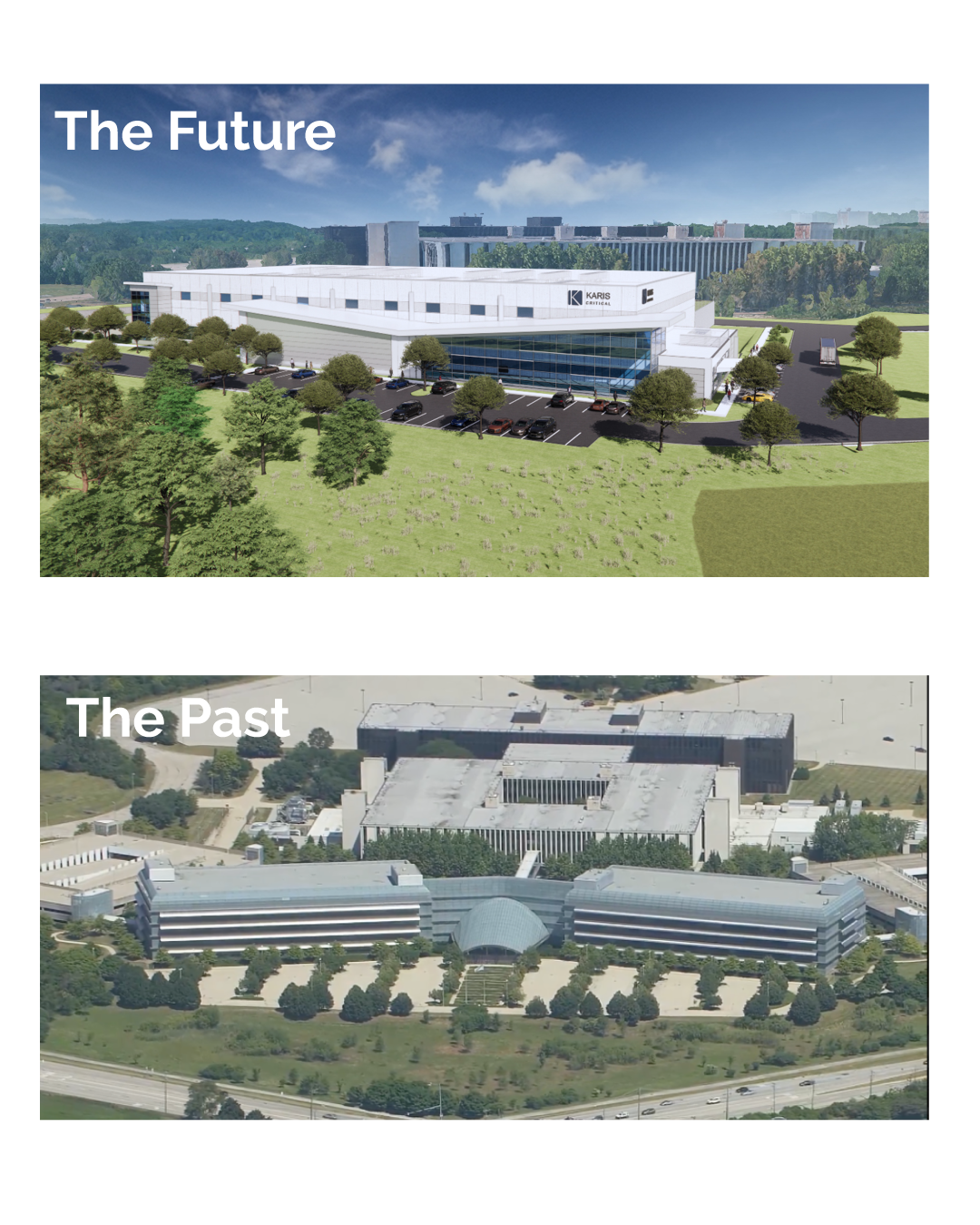
Engineered for Efficiency, Designed for Naperville, & Committed to Stewardship: Transforming a Vacant Corporate Campus into a Jobs & Tax Engine for Naperville
The proposed redevelopment of 40 acres of vacant land at 1960 Lucent Lane into a best-in-class boutique data center campus presents a unique opportunity to advance Naperville’s economy by securing a significant investment that brings critical digital infrastructure into the community to helps revitalize the tollway corridor, while unlocking substantial economic and fiscal benefits.
Karis has proposed investing tens of millions of dollars in best-in-class design and operating technologies to ensure that the campus operates sustainably and efficiently for decades to come. As a result of these investments at the outset, the campus will seamlessly integrate into Naperville, producing substantial benefits, while having a minimal impact on the environment.
As a good corporate citizen with roots and employees who live in the community, Karis has voluntarily proposed a Community Stewardship Pledge to be incorporated into the City of Naperville’s approval of the proposal, which would create binding obligations on the property and guide the campus’ operations for decades to come.
Key Considerations:
- Commitments regarding operations will be a condition of zoning approval as part of the Community Stewardship Pledge, providing municipal oversight and accountability of the campus’ operations.
- Karis is not seeking city approval for the right to construct the Phase Two building at this time and the scale has been reduced to one building.
- The cooling system does not utilize potable water from the City-owned utility.
- All requests of the DuPage Forest Preserve were incorporated into the design and operations of the campus.
- Naperville residents and ratepayers will not be required to pay or subsidize any necessary upgrades to the city’s utility infrastructure that are directly related to the data center campus.
Site Stewardship and Environmentally Conscious Operations: Throughout the design stage, Karis has incorporated best practices and undertaken several site-specific stewardship initiatives to ensure the campus operates in accordance with the environmental values and expectations of the company, its tenants, the City of Naperville, and the State of Illinois. As proposed, the campus will be one of the most environmentally responsible data centers operating in the Midwest.
Using Best Available Technologies & Equipment: Karis envisions building an environmentally conscious computing campus that attains the highest levels of stewardship. The company plans to invest tens of millions of dollars is best-in-class design and advanced operational technologies, to build a campus that will sustainably and efficiently operate for generations.
Minimal Water Usage: The campus will utilize a closed-loop cooling system, which does not rely on water supply from Naperville’s utility. The system is filled with water delivered to the site and experiences minimal loss throughout its operations. No potable water is used for the cooling system. As a result, it is expected that each building on the campus will use less than 5,000 gallons of water per day, considerably less than what was consumed by the former office building on the property. For comparison, according to Naperville’s water utility, the city consumes approximately 13 million gallons of water per day.
Electric Infrastructure: Data centers rely on electricity to function. As a large load customer, Karis has been in coordination with the City’s Department of Public Utilities. The developer will cover 100% of all associated utility infrastructure costs to accommodate the campus and Naperville residents and ratepayers will not pay or subsidize any necessary upgrades to utility infrastructure. Instead, the data center will generate considerable utility taxes for the government, providing resources that can be reinvested to improve the reliability and resiliency of the city-owned electric grid.
Backup Generation & Reliability: Naperville is among the most reliable electric utilities in Illinois, with reliability ratings that are considerably better than those of ComEd. The property is located adjacent to a substation, and as a result, it has one of the most reliable connections in all of Naperville. This site-specific attribute will significantly reduce the projected need for the backup generation equipment to run.
Like other essential institutions in the community, the backup generation will be maintained and tested monthly. Karis has committed that the generation will exclusively serve as backup power and not as a primary source of electricity. The developer has pledged to use equipment that achieves U.S. EPA Tier 4 Certification, which incorporates the most advanced emission control systems available on the market.
Indiscernible Sound Impact: As part of its commitment to being a responsible operator and good neighbor, Karis commissioned a comprehensive sound study that modeled the impact its operations would have on the surrounding area. The city hired a third-party to peer review the findings. Karis is investing in industry-leading technologies, including screening, sound suppression, and mechanical systems, to reduce noise and sound at the source.
Additionally, the campus design leverages the property’s isolated status and setbacks. The proposed campus is nearly 1,000 feet from Weatherbee Lane and the closest residences, and more than 300 feet from Warrenville Road, providing a considerable buffer that allows sound energy to dissipate over this area.
As a result of the design, setbacks, and Karis’ investments in industry-leading technologies and screening, the sound study concluded the campus would have at most a barely perceptible increase in sound, ranging between 0.2 and 1.4 dBA, at any point in the day compared to current conditions.
